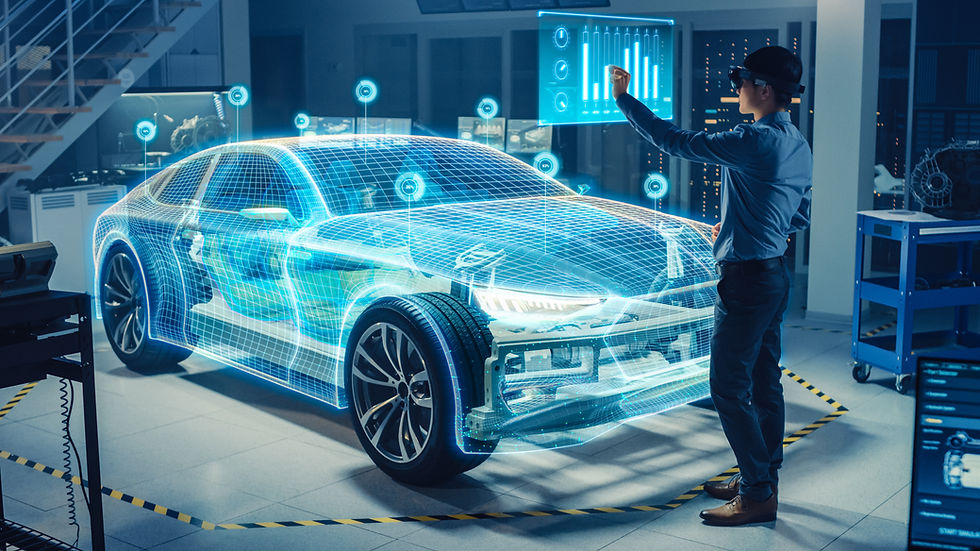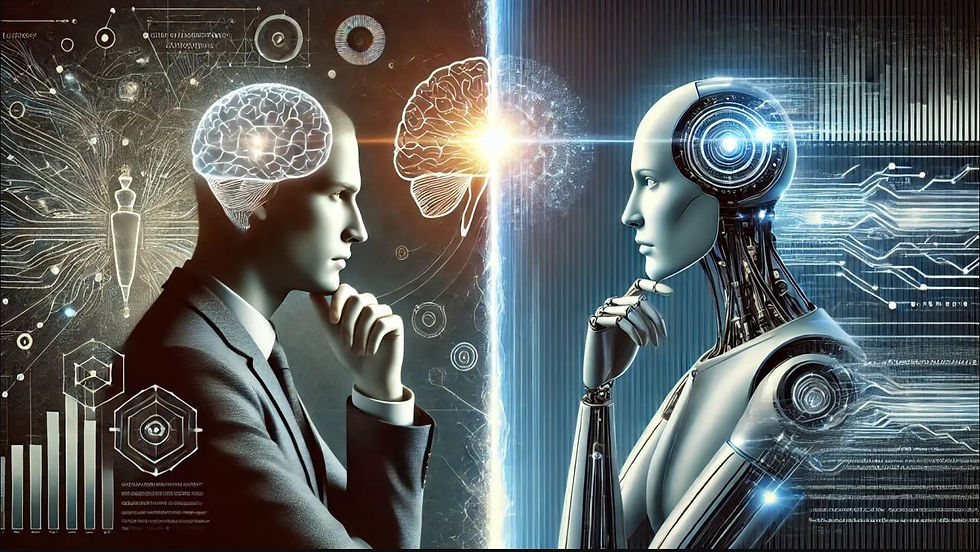Implementing Industry 5.0 and the impact on Operations and Supply Chain Planning
- Yvonne Badulescu
- Feb 19, 2023
- 5 min read
Updated: Oct 20, 2025
The European Commission are investing millions of euros in research projects [1] that will lead the green and digital transitions towards a more sustainable, human-centric and resilient European industry. This article explains what is Industry 5.0 and how it is different to Industry 4.0, as well as outlines the potential impact on current operations and supply chain planning, and how it can be implemented.
What is Industry 5.0?
Industry 5.0 is a term used to describe the next phase of industrial development that builds upon the foundation of Industry 4.0. While Industry 4.0 is characterised by the integration of advanced digital technologies into industrial processes, Industry 5.0 aims to combine these technologies with human creativity and innovation to enable more personalised and sustainable manufacturing.

At its core, Industry 5.0 aims to create a more human-centered approach to manufacturing that focuses on customisation, sustainability, and social responsibility. This means that manufacturing processes will be optimised for both efficiency and social impact, with an emphasis on reducing waste, improving energy efficiency, and promoting social well-being.
How does Industry 5.0 impact operations and supply chain planning?
In terms of operations planning, Industry 5.0 will require a shift in focus from traditional mass production to more flexible and adaptable manufacturing processes. This will involve the integration of advanced digital technologies such as artificial intelligence, machine learning, and the Internet of Things with human creativity and innovation to create more customised and personalised products.
Operations as well as supply chain planning will need to be more responsive and adaptable to changing customer demands, as the focus shifts from producing large quantities of standardised products to producing smaller batches of customised products. This will require closer collaboration and communication between manufacturers, suppliers, and customers which may involve developing new partnerships with suppliers that share the same sustainability goals [2] and values. Industry 5.0 will also require greater transparency and real-time data analysis throughout the supply chain. Supply chain planners will need to be able to track and analyse data in real-time to make more informed decisions and to respond quickly to changing market conditions. This will require the integration of advanced digital technologies such as artificial intelligence, machine learning, and the Internet of Things [3] into supply chain planning.
"Industry 5.0 will require a greater emphasis on creativity and innovation in supply chain planning"
Additionally, Industry 5.0 will require a greater focus on sustainability and social responsibility in operations planning. This will involve optimising manufacturing processes to reduce waste, minimise environmental impact, and promote social well-being. It will also require a greater emphasis on transparency and ethical practices throughout the supply chain. Moreover, Industry 5.0 will require a greater emphasis on creativity and innovation in supply chain planning. Supply chain planners will need to be able to think outside the box and come up with new ideas and approaches to optimise manufacturing and supply chain processes. This will require a shift in mindset from traditional planning methods to more innovative and agile approaches.
Implementing Industry 5.0
Implementing Industry 5.0 in manufacturing and supply chain can be a challenging process, but it can also be highly beneficial for companies that are looking to innovate, become more sustainable, and remain competitive.

Here are some steps that can be taken to implement Industry 5.0:
Start with a clear strategy: Before implementing Industry 5.0 technologies, it is important to have a clear strategy in place that outlines the goals and objectives of the transformation. This strategy should include a roadmap for how the company plans to integrate new technologies and processes, as well as a plan for training and upskilling the workforce.
Emphasise human-machine collaboration: Industry 5.0 is all about combining advanced digital technologies with human creativity and innovation. It is important to create a culture of collaboration between human workers and machines, and to empower workers to come up with new ideas and approaches to optimise manufacturing and supply chain processes.
Invest in advanced digital technologies: Industry 5.0 requires the integration of advanced digital technologies such as artificial intelligence, machine learning, and the Internet of Things into manufacturing and supply chain processes. Companies should invest in these technologies and work with technology partners to develop custom solutions that meet their specific needs.
Optimise manufacturing processes for personalisation and sustainability: Industry 5.0 involves a shift from traditional mass production to more flexible and adaptable manufacturing processes that are optimised for personalisation and sustainability. This means working closely with customers to understand their needs and preferences, as well as optimising manufacturing processes to minimise waste, reduce energy consumption, and promote social well-being.
Collaborate with suppliers and partners: Industry 5.0 requires greater collaboration and communication between manufacturers, suppliers, and customers. Companies should work with suppliers and partners to optimise supply chain processes and to ensure that sustainability and social responsibility are prioritised throughout the supply chain.
Develop a culture of innovation and continuous improvement: Industry 5.0 requires a mindset shift from traditional planning methods to more innovative and agile approaches. Companies should develop a culture of innovation and continuous improvement, and encourage employees to come up with new ideas and solutions to optimise manufacturing and supply chain processes.
Implementing Industry 5.0 in manufacturing requires a clear strategy, a culture of collaboration between human workers and machines, investments in advanced digital technologies, optimisation of manufacturing processes for personalisation and sustainability, collaboration with suppliers and partners, and a culture of innovation and continuous improvement. By taking these steps, companies can successfully transform their manufacturing processes and remain competitive in the rapidly evolving manufacturing landscape.
Industry 5.0 represents the next phase of industrial development, combining advanced digital technologies with human creativity and innovation to create more personalised, sustainable, and socially responsible manufacturing processes. Operations planning will need to be more responsive and adaptable to changing customer demands, while also emphasising sustainability and social responsibility throughout the supply chain. These points are the topics of my research at the Geneva School of Business Administration (HES-SO).
If you would like to learn more about research opportunities around Industry 5.0 and sustainable manufacturing, please send me an email at yvonne.badulescu@hesge.ch.
References:
“Horizon Europe Calls 2023 - Destination 6. A Human-Centred and Ethical Development of Digital and Industrial Technologies,” December 8, 2022. https://hadea.ec.europa.eu/calls-proposals/horizon-europe-calls-2023-destination-6-human-centred-and-ethical-development-digital-and-industrial_en.
Badulescu, Yvonne, Ari-Pekka Hameri, and Naoufel Cheikhrouhou. “Sustainable Partner Selection for Collaborative Networked Organisations with Risk Consideration in the Context of COVID-19.” Journal of Global Operations and Strategic Sourcing, Vol. 15 No. 2, pp. 197-218. https://doi.org/10.1108/JGOSS-11-2020-0069.
Badulescu, Yvonne, Manoj Kumar Tiwari, and Naoufel Cheikhrouhou. “MCDM Approach to Select IoT Devices for the Reverse Logistics Process in the Clinical Trials Supply Chain.” Nantes, France: Springer International Publishing, 2022.




Comments